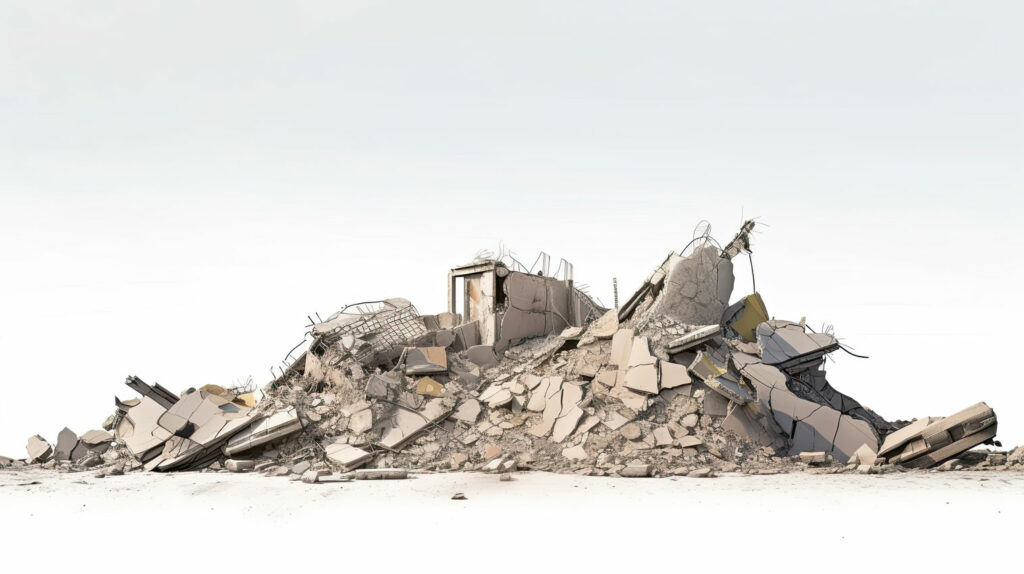RAAC: How the concrete crumbles

The discovery of failing reinforced autoclaved aerated concrete (RAAC) in schools just before the beginning of term certainly caught the attention of the public and the media. The problem of RAAC is, however, much more widespread. In this article, we consider the impact for those who own or lease property which may be affected.
What is RAAC and what are the problems?
RAAC is a lightweight form of precast concrete that was primarily used in the construction of various public buildings between the 1950s and 1990s. It was also utilised in commercial construction – particularly flat-roof structures – and buildings originally developed by local authorities.
Research has shown that the lifespan of RAAC is 40-50 years, with some estimates putting it as low as 30. RAAC installed in the UK is therefore reaching the end of its lifespan and those buildings containing it could now be at risk of collapse. Perhaps most concerning is that collapse can happen with little to no warning as deterioration is often invisible. A government report suggests if RAAC collapses then “injury or death is very likely, and the risk is critical.”
For schools, this left many buildings unoccupiable for the start of term as it was not considered safe to allow children inside until the RAAC could be assessed. Many people occupying commercial buildings built between the 1950s and 1990s are also questioning if their building is safe and what steps may need to be taken if it becomes clear that RAAC is present.
Impact on leasehold commercial property
The specific terms of your lease will be key to determining where liability for failing RAAC falls. If you have a lease of part of a building or unit, it is likely that the structure of the building will not be included in your demise and will remain the landlord’s responsibility.
If you have a lease of a whole building or unit, it is more likely to be on full repairing and insuring (FRI) terms and the structure will be your responsibility. This may be problematic given RAAC often does not show any signs of disrepair or damage before collapse, and it is unclear whether remedial works can be – or will need to be – carried out if there are no signs of failure.
Under the terms of the insurance provisions in most standard leases, the landlord would not be obliged to reinstate the building in the event of damage or destruction due to failure of RAAC. Further, it is unlikely to be caught by standard uninsured risk provisions, which may mean rent will not be suspended if RAAC damage occurs and your building is unoccupiable. As a result, if you are taking a new lease of a property which may contain RAAC, it is advisable to ensure that adequate provisions are included in uninsured risk clauses as a catch all to ensure you are not left paying rent for a building you cannot use or occupy.
It seems an unrealistic burden for tenants to have to regularly commission surveys on their leased property to ensure that no hidden defects are present.
Impact on freehold commercial property
Many owners of commercial property will be wondering who will foot the bill if RAAC is found, and whether they will be able to continue to occupy, let or sell their premises. Due to the age of buildings at risk of collapse, it is unlikely any building warranties will remain enforceable and thus the responsibility will fall to the owner (unless any lease terms suggest otherwise as above).
Whilst expensive, it may be prudent to undertake a survey of your property if you are concerned about the presence of RAAC as, if works do need to be undertaken, it is better to complete this before any damage or destruction occurs.
Property transactions in England and Wales operate on a buyer beware basis, which places the onus on the buyer to determine relevant information about a property before purchase or lease. Whilst there is a duty on a seller not to misrepresent the information they provide, they may not be aware of the presence of RAAC or its condition. It is therefore important to ensure that all relevant enquiries are raised before a purchase or lease and, if necessary, have appropriate surveys carried out.
What’s next?
How RAAC will be treated in future property transactions remains to be seen. Whether RAAC is present in a building may in the future be a question raised in Commercial Property Standard Enquiries before entering into a new lease. However, unless it becomes a statutory requirement to provide full information in that regard, it is likely landlords will require tenants to rely on their own surveys.
There are suggestions that it may be considered a property defect – much like asbestos – and sellers or landlords may be obliged to provide surveys showing a property is free from RAAC, or that any necessary remedial works have been undertaken. This is, however, an evolving situation and it is likely more guidance will follow.
Our specialist team of real estate lawyers will be happy to discuss the legal interpretation and drafting of commercial property documents with you, as well as talking you through any questions you may have about the topics discussed above.
Contact usActing for local, national and global clients, our Legal 500 and Chambers-rated real estate team has outstanding technical expertise to advise on a huge range of property transactions and non-contentious construction issues.
Contact
Emma Thompson LLB (Hons)
Associate, solicitor
View profile


Related services
Share this article
Willans plays role in Winchcombe Arts and Community Hub
Our real estate team has advised a local charity on its purchase of Winchcombe Methodist Church as part of their plan to open a brand-new arts, youth and community hub.…
Willans
Solicitors
Charity land: A widening of the pool
We previously reported on the new Charities Act 2022. The first wave of provisions in relation to charity land are now in force, with more expected to be in force…
Charlotte Cowdell BA (Hons), LLB
Associate, solicitor

The rise of the electronic signature
Our real estate experts explain more about how electronic signatures are now considered legally binding from a property perspective. In our real estate department, we now regularly use a platform…
Charlotte Cowdell BA (Hons), LLB
Associate, solicitor









